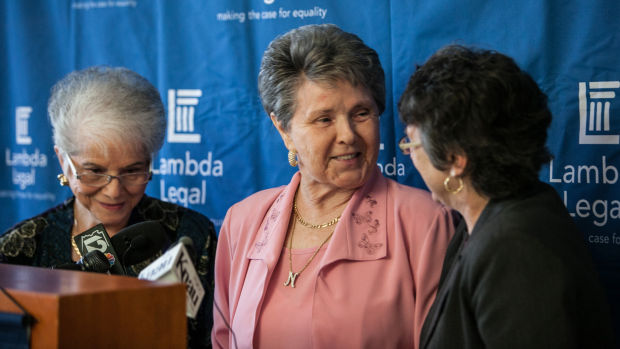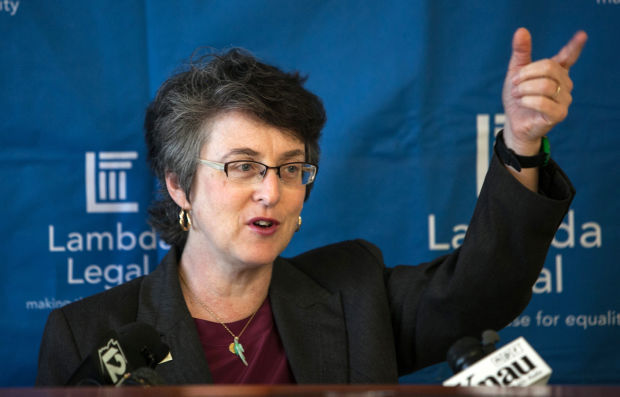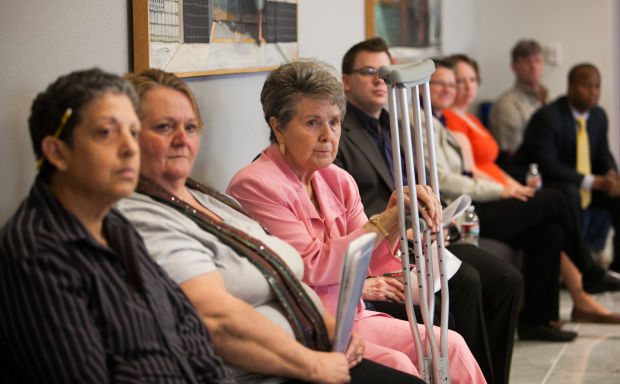PHOENIX — Unwilling to wait for a 2016 vote, advocates for same-sex marriage asked a federal judge Thursday to rule the state’s ban is illegal.
The lawsuit challenges longtime state laws and a voter-approved 2008 state constitutional amendment defining marriage in this state as solely between one man and one woman. Jennifer Pizer, senior counsel for the Lambda Legal Defense and Education Fund, representing seven Arizona couples and two survivors of same-sex relationships, contends that ban violates federal constitutional provisions.
“Because our clients are not able to marry, they’re being denied equal protection under the laws, which should be a birthright of all Americans,” she said at a Phoenix news conference detailing the legal action.
Attorney General Tom Horne said he thinks the Arizona law is legally defensible.
Horne sidestepped the question of whether allowing heterosexual couples to marry but denying that right to same-sex couples amounts to unequal treatment. He said that’s not the legal issue. “The question really is, what is the definition of marriage,” he said.
“I would say that the Legislature, and the people acting through the Legislature, have a right to define what is marriage,” Horne continued. “And that should be a decision made by the people governing themselves rather than the judiciary imposing it on them.”
The lawsuit comes as proponents of same-sex marriage are gearing up to put the issue on the 2016 ballot. In fact, many of the same organizations and plaintiffs are involved in that effort.
Pizer said the timing of the lawsuit had nothing to do with the recent dust-up over SB 1062, which was perceived as an effort to provide legal cover for people to use their sincerely held religious beliefs to deny services to gays and others. Pizer said the lawsuit had been in the works for “quite a long time.”
The challengers fall into three categories.
First are Arizona couples who want to marry but cannot because of Arizona law.
Nelda Majors, 75, spoke of being with 74-year-old partner Karen Bailey since they were in college in the 1950s. But she said the issue goes beyond wanting state recognition of their relationship.
Majors pointed out that the Scottsdale couple has been raising Bailey’s two great grand-nieces for more than a decade.
“Only Karen is recognized as their legal guardian,” she said. “If something should happen to Karen, my relationship with these wonderful girls could be in danger.”
Tucsonans Jennifer Hoefle-Olson and Kelli Olson joined the lawsuit for similar reasons: A desire to protect the twin 1-year-old daughters they are raising.
Hoefle-Olson said despite a civil marriage she and Olson had in Minnesota, Arizona doesn’t recognize the couple as married or as equal parents to their daughters. “Legally, our state recognizes us as strangers even though we are building a life together,” Hoefle-Olson, 38, said.
Hoefle-Olson, the birth mother of the girls, said her wife has no parental rights. She wants to see her home state Arizona join the 17 other states that have legalized same-sex marriage.
“I’m an Arizona native,” Hoefle-Olson said. “I shouldn’t have to choose between my home or protecting my family.”
Vicente Talanquer and Kent Burbank are in a second category, having been legally married in Iowa last year. But their relationship is not recognized here.
According to the lawsuit, only Talanquer is legal father to two boys they adopted out of foster care. Burbank wants legal recognition of their marriage so he, too, is considered a parent.
In the third category is Josefina Ahumada of Tucson, survivor of Helen Battiste, whom she legally married in New Mexico. The lawsuit says that after Battiste’s death the state refused to issue Ahumada’s application for a death certificate and was willing to deal only with her son.
Pizer and Horne did agree on one issue: It may not matter who wins in federal court in Arizona.
Both noted there already are similar cases farther along in the federal courts.
They include another case being pursued by Lambda Legal challenging Nevada’s voter-approved ban on same-sex marriage. While a trial judge upheld the law, the 9th U.S. Circuit Court — the same one whose rulings hold sway over Arizona — is expected to hear arguments later this spring.
Horne said the issue ultimately will be decided by the U.S. Supreme Court.
In a similar suit filed in U.S. District Court in Phoenix, defendants also seek to end the state’s ban on same-sex marriage.
That lawsuit says state laws banning gay marriage violate the equal-protection and due-process clauses of 14th Amendment to the U.S. Constitution.
Attorneys in the case argue Arizona’s 1996 law banning the marriage of two same-sex people and a 2008 ballot question that defined marriage as a union of one man and one woman be enjoined from further enforcement.
Despite arguments that voters legally approved the 2008 measure from advocacy groups responsible for the ballot question, plaintiffs said the courts are obligated to protect residents from unjust legislative acts and voter initiatives.
Tucson couple Peter Bramley and Jeffrey Ferst joined that suit as plaintiffs in February after unsuccessfully trying to get a marriage license in Pima County Superior Court. Six other couples from across the state also joined in that case.
Judge John Sedwick has asked for a report on the status of that case by April 1.






